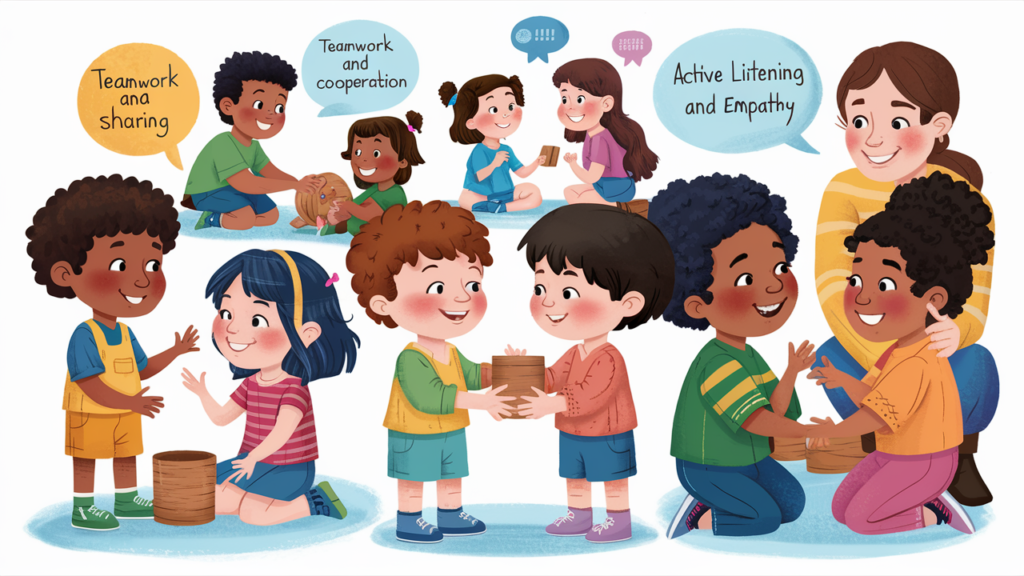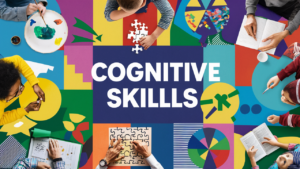Early childhood is a crucial period for development, and social skills are at the heart of it all. These vital abilities shape how children interact with others and navigate their world. From making friends to expressing emotions, strong social skills lay the foundation for healthy relationships throughout life.
In today’s fast-paced environment, fostering these skills has never been more important. As young ones explore connections beyond family ties, they begin to understand cooperation, empathy, and communication. Yet many parents wonder: how can we effectively nurture these essential qualities during those formative years? This guide will illuminate effective strategies to cultivate social skills early on so your child thrives in any setting.
What are Social Skills?
Social skills are the abilities that help individuals communicate and interact effectively with others. They encompass a range of behaviors, such as listening, sharing, and empathy.
From early childhood, these skills play a crucial role in building relationships. Children use social skills to navigate friendships and work collaboratively in group settings.

Effective communication is at the heart of social skills. This includes verbal exchanges and non-verbal cues like body language or facial expressions. Understanding how to express feelings appropriately also falls under this umbrella.
Developing strong social skills fosters emotional intelligence too. Children learn to read emotions in themselves and others, which enhances their ability to connect on a deeper level.
The presence of solid social skills can significantly influence academic success as well. Students who engage positively with peers often experience better learning environments and outcomes throughout their educational journey.
The Impact of Technology on Social Skills Development
Technology plays a significant role in shaping how children interact. With the rise of smartphones and tablets, many young ones are spending more time glued to screens than engaging with peers.
This shift can hinder face-to-face communication skills. Eye contact, body language, and tone of voice often take a back seat when conversations happen through text or social media.
Moreover, virtual interactions sometimes lack the emotional depth found in real-life scenarios. Children miss out on learning essential cues that only come from direct human interaction.
While technology offers educational benefits and access to vast information, it’s crucial for parents to monitor screen time. Balancing digital engagement with opportunities for interpersonal connection is vital for healthy development.
Encouraging tech-free playdates can help bridge this gap while fostering stronger relationships among friends. This way, kids learn to communicate effectively both online and offline.
Strategies for Fostering Social Skills in Young Children
Encouraging playtime is vital for developing social skills. Play provides natural opportunities for children to interact with their peers. It fosters cooperation, sharing, and negotiation.
Modeling positive behaviors is equally important. Children learn by observing adults. Show them how to greet others, express feelings, and handle conflicts gracefully. Your actions set the tone for their interactions.
Role-playing can be a fun way to practice social scenarios. Create simple situations where they can engage in pretend play—like being at a store or hosting a birthday party. This builds confidence in navigating real-life interactions.
Incorporating group activities also helps strengthen these skills. Team sports or group crafts encourage collaboration while teaching valuable lessons about working together towards common goals.
Each of these strategies opens doors for young minds to explore friendships and communication naturally, setting the stage for healthy relationships as they grow older.
A. Encouraging Playtime and Interaction with Peers
Playtime is essential for developing social skills. It allows children to engage with their peers naturally. Through play, they learn to share, take turns, and communicate.
Encouraging group activities can spark collaboration among kids. Consider setting up playdates or small gatherings where children can interact freely. These environments foster friendships and help them navigate social dynamics.
Unstructured play is particularly beneficial. It gives kids the freedom to explore their creativity without adult interference. This type of interaction often leads to spontaneous problem-solving and negotiation between peers.
Introduce games that require teamwork. Activities like building a fort or playing tag promote cooperation and understanding of others’ perspectives.
Observing how your child interacts during these moments provides insight into their developing social skills while allowing you to offer guidance when necessary.
B. Modeling Positive Social Behaviors
Children are keen observers. They learn by watching the behaviors of adults around them. Modeling positive social behaviors is a powerful tool in fostering these skills early on.
Demonstrating kindness, respect, and good communication sets a strong example. When kids see you greeting a neighbor or sharing with friends, they begin to understand the importance of these actions.
Engage in conversations at home that reflect empathy and active listening. Show your child how to ask questions and express feelings appropriately.
Encourage cooperation during family activities like cooking or playing games. This not only builds teamwork but also teaches patience and compromise.
Remember, consistency matters. The more frequently children witness positive interactions, the more likely they are to imitate those behaviors themselves. Your influence can shape their understanding of healthy relationships for years to come.
C. Role-playing and Pretend Play Activities
Role-playing and pretend play activities offer wonderful avenues for children to explore social dynamics. When kids engage in these imaginative scenarios, they practice communication, cooperation, and empathy.
Dressing up as different characters provides them with the freedom to express themselves while learning how to interact with others. Through role-play, a child can navigate various situations—like sharing toys or resolving conflicts—which are essential skills for their development.
Encouraging your little ones to act out familiar stories or everyday experiences can be both fun and educational. These playful interactions help children understand emotions better and develop critical thinking skills as they consider perspectives other than their own.
Simple props like dolls, action figures, or even household items can ignite creativity during playtime. This not only fosters social interaction but also enhances language abilities as children articulate thoughts and feelings within their roles.
Addressing Challenging Behaviors
Addressing challenging behaviors in young children is essential for fostering social skills. It requires patience and a keen understanding of the underlying emotions driving these actions.
Often, disruptive behavior stems from frustration or inability to communicate feelings effectively. Listening to your child is crucial here. Validate their feelings while guiding them toward more appropriate expressions.
Redirecting attention can also be beneficial. If a child acts out, shifting focus to an engaging activity helps diffuse tension and encourages positive interactions with peers.
Implementing consistent routines creates predictability, reducing anxiety that may trigger such behaviors.
Positive reinforcement plays a significant role as well. Celebrate small successes when they handle situations well, reinforcing desirable behavior over time.
By helping children navigate their emotions and reactions, you pave the way for better social interactions down the line.
Partnering with Teachers and Caregivers
Building strong relationships with teachers and caregivers is essential in fostering social skills early. These adults play a pivotal role in shaping children’s interactions and behaviors.
Open communication can make a significant difference. Share your goals for your child’s social development with them. When everyone is on the same page, it creates consistency both at home and in educational settings.
Regular check-ins can help monitor progress. Discuss challenges or milestones that arise during playdates or classroom activities. This feedback loop allows for timely adjustments to strategies being used.
Involving teachers in planning group activities enhances collaborative skills among peers. They often have insights into how children interact, providing valuable perspectives you may not see at home.
Encouraging caregivers to participate actively cultivates a nurturing environment where children feel supported while they learn to connect with others effectively.
Conclusion
Fostering social skills early in life is crucial for a child’s overall development. It shapes how they interact with others and navigate their environments. By understanding what social skills are and the influences that can hinder their growth, parents and caregivers can take proactive steps to nurture these essential abilities.
Incorporating playtime with peers allows children to practice sharing, taking turns, and resolving conflicts naturally. When adults model positive behaviors—such as effective communication or empathy—they set powerful examples for young learners to follow. Role-playing activities offer unique opportunities for kids to step into different scenarios, enhancing their ability to relate with others.
Addressing challenging behaviors promptly helps build resilience and adaptability in children. Collaborating closely with teachers and caregivers creates a supportive network that reinforces these teachings outside of home settings.
Investing time in developing social skills now will yield rich benefits later on, leading to healthier relationships, improved emotional well-being, and greater success both personally and academically. It’s a journey worth embarking upon together.



